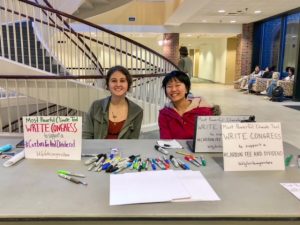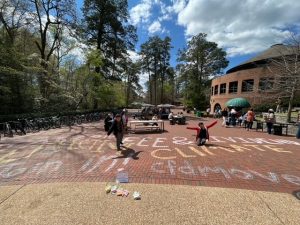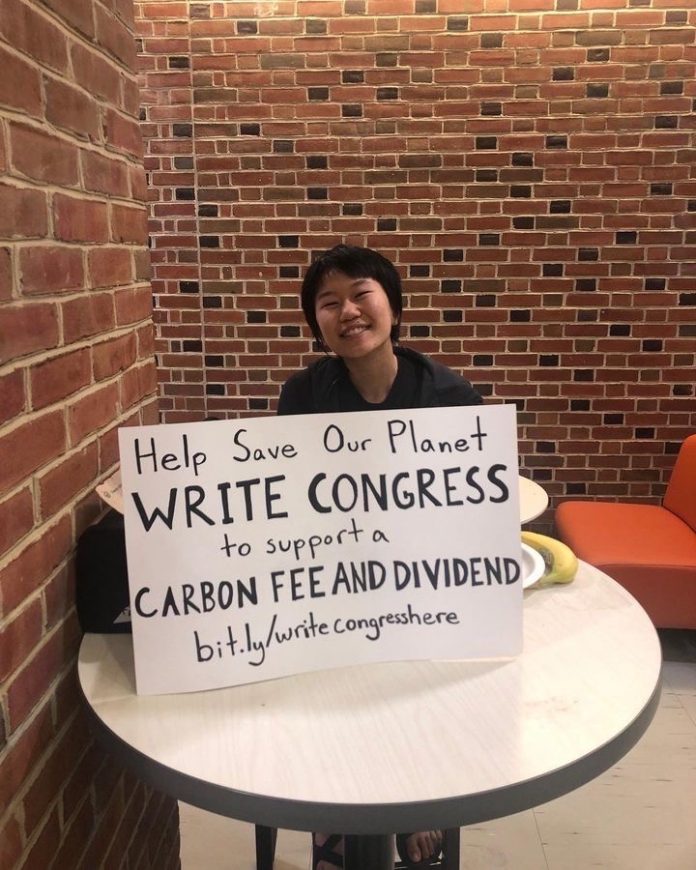In Feb. 2023, Emily O’Keefe ’24 partnered with the College of William and Mary chapter of the grassroots organization Citizens’ Climate Lobby. Her goal was to begin a passive-activism campaign in support of a national carbon fee and dividend policy to combat climate change and suggested the use of signs or posters to broadcast support during everyday activities. Within the span of a month, the campaign has grown into a “collective action movement” among the College’s student body with plans to expand across the country.
“Most Effective Climate Policy, write Congress to support a #CARBONFEEANDDIVIDEND,” the campaign’s signs say, referencing the CCL carbon price resource to write senators in Congress.

Though the national CCL organization, alongside economists and various governments worldwide, have been focused on the adoption of a carbon fee and dividend policy for many years, the College’s movement acts as the first university-based sign campaign in the United States. The movement is a separate entity from CCL, but maintains vocal and direct support from the organization.
“Everybody has a moment when they realize that the way that the world works is not sustainable, and I think I learned that kind of late,” O’Keefe said. “But when I realized that infinite growth is impossible, and that we’re going through a crazy, terrible climate crisis, I was really scared. It takes a lot to put yourself out there with a sign and say you stand for something. And I was thinking, well, we’re going through something that’s way bigger than all of us, just an existential threat, and I’m surprised that not more people are screaming and sitting with signs or anything.”
A carbon fee and dividend policy enforces a tax on corporate polluters based on how much carbon dioxide they emit. The tax revenue from increased carbon prices would then be distributed equally amongst American citizens via tax refunds, creating a more equitable policy solution and offsetting costs of more expensive products.
“If we raise the price on these polluters, then this increase in price will go through the economy, so products that require more fossil fuels will become more expensive,” O’Keefe said. “This will incentivize people to shift to greener products and businesses to shift to greener products.”
In 2019, the Wall Street Journal released a statement from over three thousand economists, including 13 economics professors employed by the College, in support of a carbon dividend. The Climate Leadership Council called it the “largest public statement of economists in history.” The CCL website states that there are 64 carbon pricing policies currently in operation worldwide in over 25 countries. Australia and the United States are the only developed economies that do not have a nationwide carbon price. Co-president of the College’s CCL chapter Corina Chang ’25 discussed the importance of this movement in 2023.
“I want to emphasize the importance of our role as students and young people in the fight against the climate crisis,” Chang wrote in an email to The Flat Hat. “I believe as young people we have a LOT of power, because adults in office are much more likely to listen to us.”
Co-founder and co-President of the College’s CCL chapter Philip Ignatoff ’23 reflected on the early stages of the movement on campus.
“At first I was a little bit more hesitant about incorporating it into the meetings because [O’Keefe] was just so passionate about it that she wanted it to be a big part of our club,” Ignatoff said. “And it has grown to be a big part of our club, which I’m glad about. Her vision is that it’s going to be a worldwide movement, but I feel like even if it is just on campus, it’s really getting the word out a lot more than I’ve been good at in the past.”
Ignatoff mentioned that O’Keefe is currently working on a website for the sign campaign in order to spread awareness of the movement and educate others about the impacts of carbon pricing. One of the most utilized visual tools O’Keefe has included in the website is the En-ROADS simulator from Climate Interactive and the MIT Sloan Sustainability Initiative.
The simulator allows policymakers, educators and the general public to simulate climate policy solutions. The En-ROADS simulator states that though the earth is currently projected to warm around 6.4 degrees Fahrenheit by 2100, a carbon fee and dividend policy would reduce this temperature to 4.7 degrees Fahrenheit.
“If the U.S. alone had a carbon price, it would not do this, but it would contribute to that and incentivize other countries to have carbon pricing and also set an example for other countries to have carbon pricing,” O’Keefe said.
O’Keefe’s passion for activism is highly influenced by Swedish activist Greta Thunberg’s climate campaigns. According to O’Keefe, the snowball effect Thunberg has showcased is something this campaign is attempting to accomplish, as well.
“I think what’s really important with a movement is that it’s easy to join in, because when I think about climate strikes, not everyone is able to strike for the climate on a consistent basis,” O’Keefe said. “A lot of people care about the climate, so if all the people who cared about the climate were leveraged in a way that was visible and outspoken, then we would get really far.”
“A lot of people care about the climate, so if all the people who cared about the climate were leveraged in a way that was visible and outspoken, then we would get really far.”
Helen Tiffin ’26 discussed how being part of this campaign has improved her public speaking skills and confidence in advocating for what she believes in. Recently, Tiffin presented at various club meetings across campus to advocate for a carbon fee and dividend policy. At many of these meetings, presenters urge club members to create signs advocating for the policy to paste on their dorm doors or on the back of their laptops.
“I was so nervous and I had never really done anything like that before,” Tiffin said. “ I am just randomly showing up at your club and telling you things. And then I just did it again and again and again. I visited Lord knows how many clubs and I wasn’t nervous anymore, and I just suddenly have all of this confidence to be able to speak.”
Tiffin is currently working on creating a Redbubble shop to sell stickers and various other products advocating for the policy. According to Tiffin, one of the most important parts of the campaign is that it maintains a bipartisan approach in order to pass the most effective legislation possible.
“Specifically because this is nonpartisan, an active protest would scare a lot of people away…it should and can appeal to all audiences even if it’s just younger people spreading it,” Tiffin said. “There’s this energy behind it, like the air is charged. I actually think this could go somewhere.”
O’Keefe’s hope is that the sign campaign can spread to universities across the country and ultimately succeed at generating publicity to pass legislation. As of this month, they have received positive feedback from other collegiate environmental organizations across the nation.

“If all colleges start advocating for the carbon fee and dividend, students are constantly, passively and visibly, persistently advocating for a carbon fee and dividend, then there will probably be a ton of publicity about that,” O’Keefe said.
This month, student activists involved with the collective action movement are attempting to spread the word by chalking on Sadler Terrace, posting informational flyers around campus and creating an official Instagram account to support the sign campaign.
“We are convincing people to save the world,” Tiffin said. “And I actually feel like I have a part to play in it.”
“We are convincing people to save the world,” Tiffin said. “And I actually feel like I have a part to play in it.”
O’Keefe plans to spend the rest of her college career expanding the sign campaign and working with students across campus and the country to advocate for a carbon fee and dividend policy. She believes that small actions are the key to larger change.
“I’m going to keep going so hardcore on this,” O’Keefe said. “People who think they can change the world, those are the people who do. I want to believe, too, that I could be one of those people. And I think anyone could be one of those people if they really want to.”


[…] Virginians through tax refunds. A student at the College of William and Mary, Emily O’Keefe, is spearheading a movement to adopt such a policy in the […]